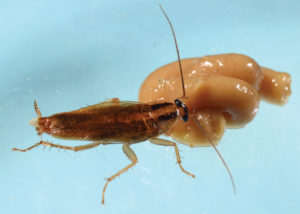Fighting cross-resistance in cockroaches
 Killing a cockroach isn't easy. Each class of insecticides works in different ways, so exterminators combine classes or switch between them regularly. If a cockroach is genetically resistant to one class of chemical, another class should kill it.
Killing a cockroach isn't easy. Each class of insecticides works in different ways, so exterminators combine classes or switch between them regularly. If a cockroach is genetically resistant to one class of chemical, another class should kill it.
But extermination is getting harder. A recent study led by Michael Scharf, professor and O.W. Rollins/ Orkin Chair in the Department of Entomology, showed that cockroaches are gaining crossresistance. If they’re exposed to one class of insecticide, a certain percentage of those resistant to that class will develop resistances to other classes — even if they’ve never been exposed to those classes.
“The resistance genes are already there. We’re just favoring individuals that have them in certain combinations,” Scharf says. And then because of their rapid reproduction potential, they increase exponentially with populations that have robust resistance to even our newest insecticides.”
Cockroaches carry bacteria harmful to human health, and the body parts, saliva and feces they leave behind have been shown to worsen or trigger asthma in children. Infestations are especially troublesome in low-income or government-subsidized housing with limited resources for proper control.
Scharf says the findings highlight the need for an integrated pest management approach to controlling cockroaches, combining chemical treatments with traps, improved sanitation and vacuums that can remove cockroaches.
Purdue Agriculture, 615 Mitch Daniels Blvd, West Lafayette, IN 47907-2053 USA, (765) 494-8392
© 2024 The Trustees of Purdue University | An Equal Access/Equal Opportunity University | USDA non-discrimination statement | Integrity Statement | Copyright Complaints | Maintained by Agricultural Communications
Trouble with this page? Disability-related accessibility issue? Please contact us at ag-web-team@purdue.edu so we can help.
